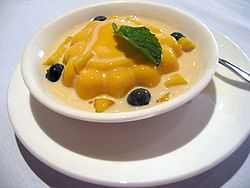|
Mango pudding |
| Chinese |
1. 芒果布丁
2. 芒果布甸 |
|---|
| Literal meaning |
Mango pudding |
|---|
|
|
Mango pudding is a Hong Kong dessert usually served cold.[1]
It is very popular in Hong Kong, where pudding is eaten as a traditional British food.[2]
Mango pudding originated in India and the recipe was introduced from the British in the 19th century. There is very little variation between the regional mango pudding's preparation. The dessert is also found in Singapore, Malaysia, Thailand, Macau and is often served as dim sum in Chinese restaurants.[3]
The fresh variant is prepared by the restaurant or eatery and consists of agar or gelatin, mangoes, evaporated milk, and sugar.[4]
In addition, fresh fruit such as mango, strawberries, berries and kiwifruit, are occasionally added as garnish. Served and eaten refrigerator cold, mango pudding has a rich and creamy texture.
Some Chinese restaurants make the mango pudding in fish shape because goldfish or koi expresses good luck in Chinese culture.[5]
On the other hand, factory-made mango pudding does not contain fresh mangoes and instead, consists of mango essence and either gelatin or agar.
Recipe
Serves 3-4
Ingredients
- 2 medium to large ripe mangoes
- 1 packet gelatine (3 tsp.)
- 1/2 cup hot water
- 1/3 cup white sugar
- 1 cup good-quality coconut milk
Variation on ingredients
Canned mangoes in its puree or pulp form may be used instead of fresh mango.[6] The recipe requires milk although the type of milk varies - white milk, evaporated milk, or any other type of milk may be used instead of coconut milk. Whipping cream or other higher fat content milks may be used to create a richer tasting pudding. Gelatin is not required - agar, derived from seaweed, may be used instead.
Preparation
- Make sure your mangoes are ripe - the fruit should be bright orange or yellow and fairly soft. Scoop out the fruit, including around the stone. Place the fruit in a food processor or blender and blitz to create a smooth mango puree. Leave the mango in the processor/blender.
- In a saucepan, heat up the water until it reaches a rolling bowl. Remove from heat. While stirring the water with a whisk or fork, sprinkle the gelatin over the surface of the water and stir briskly in order not to have any lumps.
- Add the sugar to the hot water/gelatin mixture and stir to dissolve.
- Add this mixture to the mango in the food processor/blender. Also add the coconut milk. Blitz briefly until ingredients are combined.
- Pour into dessert bowls or cups and place in the refrigerator for at least 2 hours (or up to 24 if making ahead of company coming). It may be served cold on its own or fruit and/or other toppings like condensed milk and be added. http://www.recipesforkitchen.com/pudding_and_desserts_recipes.htm
In supermarkets
Outside of dim sum and other restaurants, mango pudding can also be purchased at most Asian grocery stores or supermarkets. They can be purchased as a powder, which requires the addition of boiling milk or water to the powder, or in ready-to-eat portions.
See also
References
